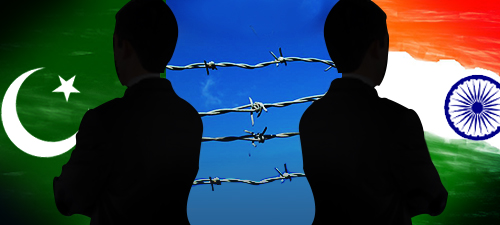Pakistan’s water diplomacy by ALI TAUQEER SHEIKH
FOR no other known reason but to avoid being seen as violating the Indus Waters Treaty (IWT), India sent a 10-member delegation to Pakistan from March 20 to 21, for the 113th meeting of the Permanent Indus Waters Commission. India had practically declined these mandatory annual meetings since May 2015. It is a positive development, even if the result was predictably inconclusive.
India and Pakistan are pursuing two diametrically opposed approaches: India is implementing a long-term plan of constructing a chain of hydropower projects while occasionally sharing drawings and sometimes even agreeing to revise them. Pakistan has no plan. It has instead relegated negotiations to water engineers who can only raise technical objections. The policy is devoid of a long-term vision and needs a new, strategic push. Pakistan is apprehensive that the Indian infrastructure will diminish water quantities over time, whereas the real threat is that it will dissipate the Indus ecosystem as we know it.
Islamabad’s regional water strategy needs to be two-pronged: i) make some strategic moves to win friends for Pakistan’s case and ii) integrate external diplomacy with domestic water sector investments.
A policy that ignores non-IWT sources of water is perilous for our security and economy.
Presently, our water diplomacy is overly Indus Waters Treaty centric, and begs for an integrated view. While the IWT is a strategic asset that both India and Pakistan must strive to protect and constantly enrich, for Pakistan it is a lifeline that drives livelihoods for the poor and lifestyles for the rich.
Pakistan gets about 127 million acre feet water under the treaty. But, as mentioned above, its water policy has become too IWT centric, often at the cost of other strategic assets: almost 70 per cent of water in our rivers flows from the glaciers; groundwater is the source of over 60pc of water used in our agriculture; and almost all of our rainwater, particularly during the monsoon, is neither harvested nor stored or productively used. Additionally, the Indus River system gets more than 15pc of its water from the Kabul River, but no agreement with Afghanistan exists to secure or regulate these flows. Our regional water diplomacy must concurrently respond to these challenges. Having a water policy that ignores non-IWT sources of water is perilous for Pakistan’s security and economy.
This country’s water diplomacy in the region must be based on four cardinal principles:
First, water for Pakistan is not only a bilateral matter with India — and Pakistan is not the only country with which India has unresolved water issues. In fact, India has unresolved water disputes with almost all its neighbours, from Bangladesh to China. India’s water neighbours can benefit from Pakistan’s experience. Pakistan should therefore elevate transboundary waters to bilateral discussions with all of India’s water neighbours — particularly Bangladesh and China, but also with increasingly more assertive Bhutan and Nepal.
Pakistan’s regional diplomacy should seek to proactively respond to India’s efforts to keep a lid on water as a bilateral matter and deal with each neighbour separately. India’s water policy can use better consistency in dealing with her neighbours, and they in turn sure can learn from each other.
Second, transboundary water is not only about diplomatic negotiations, but also an issue of upstream investments for downstream economic needs. Pakistan has not made adequate investments to secure water for its future use. Upstream investments in Bhutan by India have resulted in three hydel power projects of 1,416MW, and three more of 2,129MW are under construction. Afghanistan-Pakistan geography and topography is ideally suited for benefit sharing from Kabul River. Pakistan needs to consider similar upstream investments in Afghanistan, where the construction of 13 smaller dams is under consideration. Pakistan can fully or partially fund the construction of one or two smaller dams in Afghanistan. In return, Pakistan can secure both energy and water to lift its tribal areas and parts of Khyber Pakhtunkhwa out of water and energy deficits. A clear proposition by Pakistan can help Islamabad forge common ground with Afghanistan and, ideally, with the World Bank. Prolonged inaction by Islamabad will inevitably result in a void that can be too tempting for extra regional actors.
Upstream water investments in Afghanistan are in Pakistan’s strategic interest: increased agricultural productivity and livelihood options can help curtail migration from Afghanistan to Pakistan for economic opportunities between Peshawar and Karachi. This can also lay the foundation for regional water markets. Much like the proposed South Asian energy corridors, the time for regional water markets is fast approaching.
Third, water for Pakistan is more than about precipitation during the monsoon. Climate change is creating a similar set of challenges for regional countries in the Himalayan-Hindu Kush regions, and from the Bay of Bengal to the Arabian Sea. It is posing serious threats to food security, increasing migration and extreme events, including floods, droughts and heatwaves. Cloudbursts in Jammu inundated Sialkot, much as Nowshera became a victim of flooding in the Kabul River. Transboundary flooding risks are attributable to climate change and are engulfing the entire South Asian region. Transboundary water management needs to be ramped up by Pakistan to a higher regional and international security plateau, and employed as an instrument to enhance regional trade and economic cooperation.
Fourth, for success in regional water diplomacy, Pakistan must invest in institutional infrastructure. How could a country that depends so much on transboundary water supplies not have a full-fledged water ministry and departments at the federal and provincial levels? How could Pakistan afford not to have national and provincial water policies? Or water pricing? In order to bury the ad-hocism of regional water diplomacy, a National Commission on Transboundary Waters needs to be established with a constitutional status comparable to the Election Commission, mandated to manage all transboundary water issues dealing with the Upper Indus Basin, Afghanistan and, of course India and the IWT’s Permanent Commission.
Finally, we are notorious for using water wastefully and have extremely poor drop-to-crop ratios. We need to make investments and upscale our infrastructure, augment storage capacities and improve our agricultural system efficiencies. Getting our due share under IWT is only half the game. The other half is how efficiently and judiciously we use the water we get from various sources.
SOURCES:
The post was copied from dawn.com. ALI TAUQEER SHEIKH
The writer is CEO, LEAD Pakistan, a think tank focusing on climate and water issues.
Published in Dawn, March 25th, 2017




Comments
Post a Comment